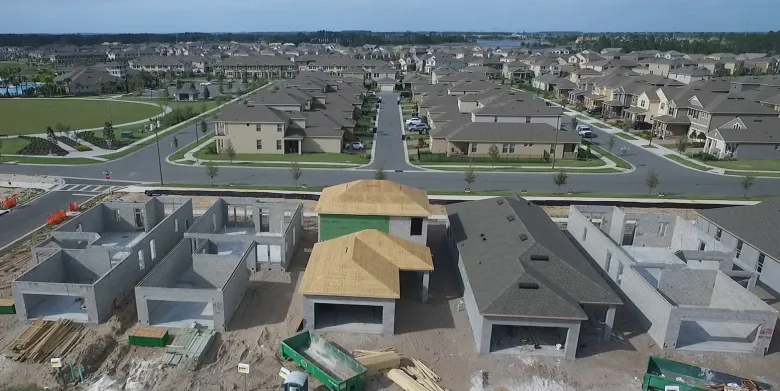
Orange County Mayor Jerry Demings discussing the Vision 2050 and Orange Code update during an April 9 Board of County Commissioners meeting. The Board is expected to vote on a proposed zoning-in-progress ordinance on May 21. (Orange County)
The Orange County Board of County Commissioners is expected to vote later this month on an ordinance that would temporarily halt new development applications in unincorporated areas of the county until a final vote on the new Vision 2050 comprehensive plan takes place in the fall.
On April 9, the Board of County Commissioners held a work session where they discussed the ongoing, countywide comprehensive plan, as well as the code update, called Orange Code. During the session, the Board requested that planning staff prepare a “zoning-in-progress ordinance”, which Commissioners will vote on during their next meeting on May 21.
Olan Hill, Assistant Manager for Orange County’s Planning Division, told GrowthSpotter that he expects the Board to approve the ordinance since they are the ones that requested the legislation. However, he pointed out that planning staff are still finalizing the specific details that will go before the Commissioners on the 21st. While the ordinance is not yet finalized, he explained that it would only apply to unincorporated areas of the County, with a few exemptions.
“[The ordinance] is only applicable in unincorporated Orange County. It doesn’t apply in any of the municipalities we have,” Hill said. “There are areas like Horizon West, which are not being affected by the changes to Vision 2050 and Orange Code, where applications could be continued to be processed. There’s only a few exceptions and Horizon West is one of them. But for the majority of unincorporated Orange County, it would be applicable.”
The ordinance, if passed on May 21, would immediately put a pause on new development applications in those areas until the final vote on Vision 2050 and Orange Code, which is planned to take place in late September.
“We’re at the point now where it would be problematic for us to continue taking new development applications that are subject to our existing comprehensive plan and our existing zoning code,” Hill explained. “Because they may still be in the review process without any type of board approval after Vision 2050 and Orange Code are adopted. So we want to avoid accepting new applications for a period of time, just so we can complete the adoption process for the new comp plan and new code.”

The Horizon West area would be exempt from the ordinance, so new permits will be accepted. (File photo)
He said that this measure is necessary for planning staff and developers as the County works on transitioning to the new rules laid out under Vision 2050.
“If we keep taking applications, then at some point Vision 2050 may be approved and all those midstream applications will be null and void. [Applicants] will have lost time and money processing those because when the new code and comprehensive plan is adopted, the rules change,” he said. “They would have to wait till the board either approves or denies the comp plan update and zoning code.”
The County has worked on Vision 2050 for several years and currently has three different public hearings scheduled to consider the legislation. The first is a public hearing with the County Planning and Zoning Commission on August 15, where the Commission will make a recommendation for or against the adoption to the Board of County Commissioners.
Next, the BOCC will consider a first reading and public hearing of the zoning update on September 10, followed by a final public hearing for Vision 2050 and Orange Code on September 24.
“We’ve been very clear that [the ordinance] is not a moratorium. We’re not halting development. We’re just putting a pause on the submittal of new applications until September 24,” Hill said.
Hill pointed out that the ordinance will apply to new applications, and that most existing applications already submitted will not be affected. Even if the Board passes the ordinance on May 21, existing applications submitted before that date will continue to move through the review process. For months, the County has notified applications about the changes coming to the review process.
“What we’ve been doing for the last six months is in on our application forms, we’ve been advising applicants that there is the risk that if their application is submitted and we’re reviewing it, that it will not be considered for final approval by the county or by the board if it occurs after September 24,” Hill said.
“Most of the applications that have already been submitted will likely be considered by the board before [September] 24th, and they’re fine. But if we start accepting applications beyond May 21, there is a very strong likelihood that they would not be through the review process in time.”
Lee Steinhauer, Government & Legal Affairs Director for the Greater Orlando Builders Association said that zoning-in-progress ordinances aren’t unprecedented. “Osceola did something similar a few years back. I mean, it’s not uncommon that they do something like this, but it doesn’t mean it doesn’t have an effect,” he said.
His main concern, upon first hearing about the ordinance, was about the potential impact on existing applications. However, a pause on new applications for several months could still negatively impact developers and builders, according to Steinhauer.
“It still could be something that will have a potentially negative effect in certain instances. But I think new applications are less concerning in this respect, certainly than zoning applications that are already in-progress,” he explained.
Hill noted that the zoning-progress-ordinance is necessary as the County transitions to the new rules laid out under Vision 2050 and Orange Code. The current rules are outdated and need an update, he explained. The County’s existing zoning codes date back to 1957, and the comprehensive plan dates back to 1991.
“They’re very antiquated documents that don’t reflect the the emerging urban communities that we have become,” he said. “That’s why we have so many applications today, is because our comp plan and code does not allow for a mixture of uses. It’s very single-use oriented, so if you if you want to do a project that has a mixture of residential and commercial or office, our comp plan and code make it very difficult to do that. So applicants have to submit applications to get around and navigate through archaic regulations. Vision 2050 and Orange Code will bring up our development standards to be more reflective of today’s development framework. That will be better for everyone”.
His expectation is that the new comp plan and code regulations will eliminate the need for many applications, and will save developers time and money.
“If you had a commercial tract today that was 20 acres and it was designated commercial, but you wanted to come in and do something a little more unique and innovative with ground-floor retail, and you wanted to do some affordable housing or multifamily above it, you couldn’t do that in our comp plan today. So you have to do a comp plan amendment to change the land use from commercial to planned development, and then you have to turn around and rezone the same property to do it. And there’s a lot of time and money that goes into that process,” Hill explained.



